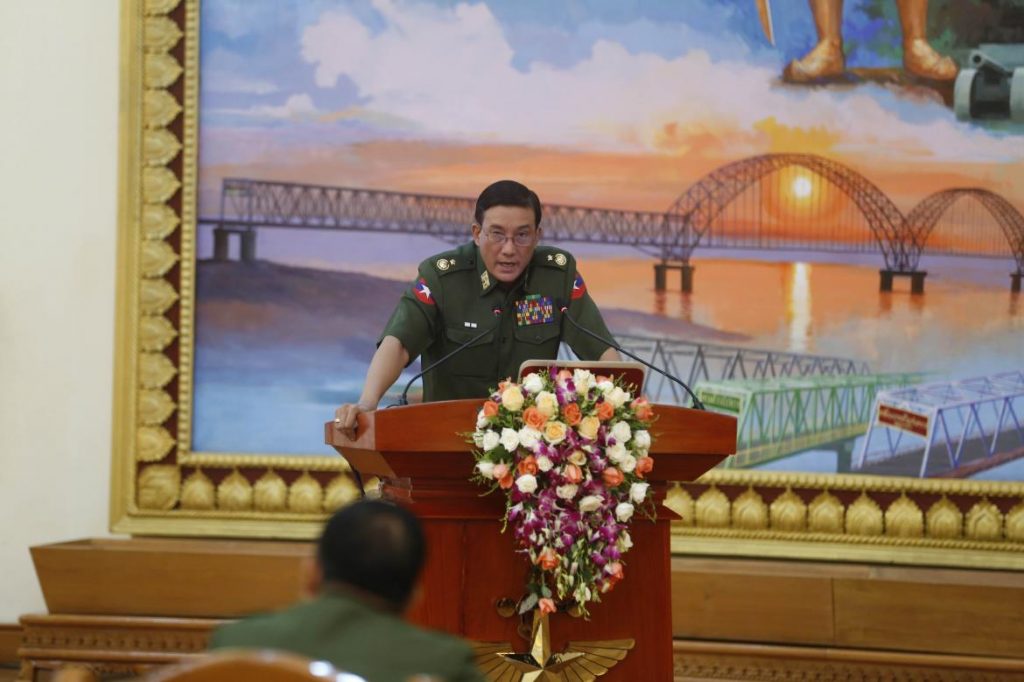By NYAN HLAING LYNN | FRONTIER
NAY PYI TAW — The government opposed a Tatmadaw move to have martial law declared in northern Rakhine State a week before the latest attacks, a senior military official said at a briefing in Nay Pyi Taw on August 29.
Major-General Than Htut Thein, the deputy head of Military Affairs Security, said Union Minister for Defence Lieutenant-General Sein Win had proposed a state of emergency and martial law for Buthidaung, Maungdaw and Rathedaung townships at a meeting to discuss security in Rakhine State “about one week before the police outposts were attacked”.
Than Htut Thein said Sein Win proposed the state of emergency order again “on the day the attacks broke out, but the martial law could not be introduced”.
Than Htut Thein did not explain why the military had believed the martial law necessary prior to August 25, including whether it had received intelligence the attacks were coming.
Support more independent journalism like this. Sign up to be a Frontier member.
Introducing the order would require the approval of the National Defence and Security Council. So far President U Htin Kyaw has refused to call a meeting of the council, Than Htut Thein told foreign military attachés and journalists at the briefing on recent events in Rakhine State.
Although Than Htut Thein did not criticise the government for refusing to call an NDSC meeting, his comments indicated the military disapproved of the government’s handling of the crisis in Rakhine State.
Major-General Aung Ye Lin, vice chair of the Tatmadaw True News Information Team, said at the briefing that the Tatmadaw is aware of concern that it has the numbers to influence decisions by the 11-member NDSC.
The council comprises up to six civilian members, including Htin Kyaw and State Counsellor Daw Aung San Suu Kyi. However, one is a vice president appointed by the military, which gives the Tatmadaw a majority on the council.
“The view of some people is that [with] six votes from the Tatmadaw and five votes from the civilian side on the NDSC, the Tatmadaw may do what they like,” said at the briefing. “But as a matter of fact, the final decision is up to the president,” he said.
The Tatmadaw says the authorisation of martial law under the previous government, after rioting in the Rakhine capital, Sittwe, communal violence at Meiktila in Mandalay Region, and fighting in the Kokang region, had enabled the rule of law and stability to return as soon as possible.
The scale of the August 25 attacks has sharply escalated the situation in northern Rakhine since extremists raided three border guard posts last October, killing nine policemen. The latest attacks targeted 30 police outposts and a Tatmadaw base and claimed the lives of 10 policemen, a soldier and an immigration officer. Dozens of extremists were killed and the death toll on both sides, including civilians, has reportedly climbed above 110.
An attempt by Frontier to ask the Tatmadaw at the media briefing why the extremists had been able to launch bigger and more serious attacks was unsuccessful.
The Tatmadaw had requested questions in advance and one from Frontier was placed fourth on a list but was not answered because the briefing was cut short.
Than Htut Thein said the Tatmadaw needed more control over the security situation in northern Rakhine because the police force was unable to prevent large-scale terrorist attacks.
Another problem was that members of the Arakan Rohingya Salvation Army, which conducted the attacks, wore civilian clothes, making them difficult to identify. “Because the terrorists dress the same way as Bengali villagers, it is difficult after they enter villages to differentiate between them and ordinary civilians,” Than Htun Thein said.
The Tatmadaw officilas said another obstacle to maintaining security is the Pyidaungsu Hluttaw vote last September to repeal a clause in a colonial-era law that required householders to report overnight guests to the authorities.
“Because we can no longer check overnight guest lists, Bengali terrorist organisations were able to infiltrate easily,” Than Htun Thein said.
The Tatmadaw officials claimed at the briefing that the ARSA has been able to organise 50 percent of the population living in northern Rakhine and create opportunities to establish territorial control.
Than Htut Thein said that to rescue civilians who had been trapped by “extremist Bengali terrorists”, the Tatmadaw was prepared to take necessary action according to the law with the approval of the state and Union government.
U Zaw Htay, the spokesperson for the Office of the State Counsellor, declined to comment on the remarks by the Tatmadaw.
In the aftermath of the August 25 attacks, the government declared ARSA a terrorist group and said action would be taken against its members, supporters and accomplices according to the law.
State Counsellor Daw Aung San Suu Kyi also said in a statement that her administration had warned security-related ministries that there might be an attack timed to coincide with the release of the final report of the Advisory Commission on Rakhine State.
Headed by former United Nations secretary-general Mr Kofi Annan, the commission issued its final report on August 24.
Parliamentary representatives refused to comment on the Tatmadaw claim that it had sought a state of emergency both before and after the August 25 attacks.
Regarding the implied Tatmadaw criticism of the repeal last September of what was known as the “midnight inspections” clause in the Ward and Village-Tract Administration Law, the chairman of the parliamentary bill committee, Amyotha Hluttaw MP U Zaw Min (National League for Democracy, Sagaing-6), said it could be reinstated, if necessary.
“At this time it is better to be working together rather than blaming each other,” Zaw Min said on Wednesday.







